Sunday Gold review
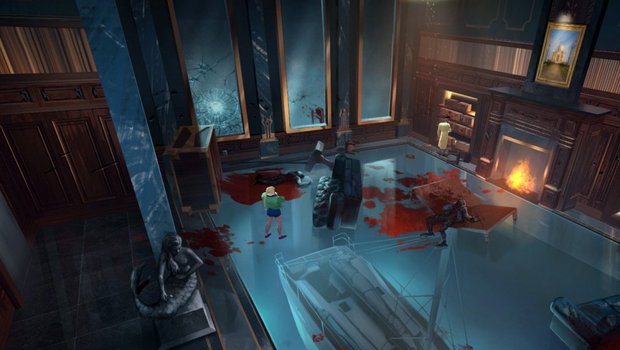
- 1 Comment
Far from a traditional adventure, this neo-noir RPG offers no rest from its challenging combat
Sunday Gold, a point-and-click adventure and turn-based RPG hybrid, may have been developed by Canadians but it’s an extremely British game. Perhaps that statement conjures ideas of rigid ceremony, of dignified accents and royalty, of a posh upper tier and afternoon tea society that a mere commoner could only dream about. But the backdrop for Sunday Gold is not that of The Crown—the setting of this world is that of the seediest of London underbellies, of poorly lit bars with profane bouncers, of scofflaw rogues who frequently yell things like “bollocks” and “shite” along with much more conventional profanities in abrasive Cockney accents, and of the mysterious underground society of cybernetically enhanced dog racing. It’s a rather strange package, but it’s ultimately a very stylish and intriguing one—though one that is certainly not designed to appeal to adventure game fans.
The game takes place in a somewhat dystopian vision of London circa 2070. You play as Frank Barber, a career small-time criminal who hangs out at the Jolly Hangman bar, swearing at patrons and planning modest heists with frequent accomplice Sally Wheeler in your makeshift basement lair. The bad guy in this world is Kenny Hogan, the stereotypical evil industrial billionaire wielding his dastardly influence over this bleak city, earning his fortune from a very violent variation of dog racing known as the King’s League, led by his particular champion racer, the titular Sunday Gold. After our main protagonists link up with the eccentric and paranoid hacker Gavin Dorsey, whose day job provides him close proximity to information that can be used to bring down Hogan, our trio of antiheroes embark on a series of missions to expose the villain.
The game consists of three lengthy story chapters, as well as a brief prologue to acclimate you to the unique gameplay aspects, which serve to quickly demonstrate the many ways in which Sunday Gold does not feel the least bit like an adventure game. Navigation itself will immediately be jarring to those used to watching their characters walk around the screen as directed by pointing and clicking. Here, instead of moving, you’ll select an interactable object on-screen (framed in yellow as the cursor passes over them) and be presented with a menu of options: move to, examine, open, etc. Selecting any option sends a bolt of visual static across your screen with matching shocking sound effect as your character immediately teleports to the object. Was that really necessary, I found myself asking, to so overstylize the character movement rather than just show them walking? If you have a fear of electric shock, you’ll find the constant lightning teleports to be a fairly unpleasant aspect of the game (and don’t shame—electrophobia is a real thing). I understand that nothing is more tedious than slow walking, but there has to be a happy medium where characters still are animated to move like actual people.
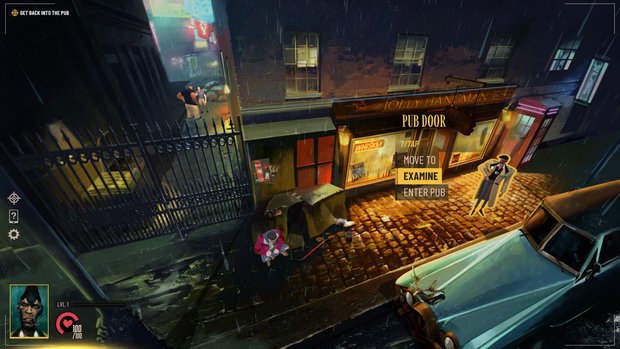
If you think the lack of walking defies typical adventure expectations, you’ll really be surprised to find that selecting those menu options will actually cost you points—Action Points (AP) to be specific, which are limited at the beginning of each “turn” and are used as you interact with specific objects. Once Frank meets Sally and Gavin, and your party reaches its permanent size of three after the early sections, you can select which character is performing an action such as opening a door in order to spread the AP depletion around the team—but they deplete fast anyway, and every action other than Move and Examine drains at least some AP, though the actual amount of points to be used is helpfully spelled out in each menu. Character-specific actions (such as pulling a large crate, which only your tank character Sally can do) can sometimes sap more than half of your available AP.
So now you find yourself needing more AP to perform the task at hand—what now? In another break from a true adventure feel, you’ve got an “End Turn” button present at all times; choosing this will recharge the AP of all characters in your party—but not without another cost, as each turn raises the Alert Level of all enemies present throughout the current mission, which causes all kinds of headache as it’s less likely you’ll be able to avoid combat. The result of all this is some genuinely thoughtful strategy about which characters to use for which action, and which actions are maybe unnecessary. That conserve-your-action approach is certainly divorced from the normal adventure philosophy of interacting with everything you can in every way you can.
Now that we’ve discussed the odd menu-style interactions and the stats-based nature of gameplay, let’s talk about the combat! Yes, Sunday Gold features some extremely RPG-style battles in a classic turn-based fashion, where your characters take turn selecting from a substantial list of attack, defend, or ability options (based on the weapons and abilities that you have equipped them with between fights) and direct their attacks toward their enemy of choice.
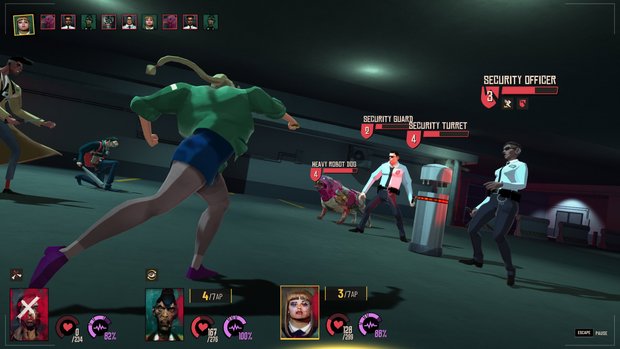
These battles primarily hinge on a statistic called composure, which is impacted both by in-battle and other actions. A character with low composure will not only have less time to make their decisions, but the entire game interface is visually screwed up, causing certain words to be blurry or glitchy or various other visual effects that you might experience in a state of complete panic. It’s actually a pretty cool concept, but in practice, like many aspects of the combat, it can be intensely frustrating to navigate. The pre-battle composure reductions are difficult to avoid, and resources are so precious during a skirmish that you won’t want to spend a turn using one of the available items or abilities to restore that composure when the enemy is already knocking you around.
I used the word “unpleasant” earlier, and I feel like that’s an apt description of the look and sound of this game. Not in a way that implies poor quality, but this is certainly not a pretty game in any technical aspect, which is a very deliberate stylistic decision. The static backgrounds are reasonably detailed, usually heavy on darkness and shadow (in keeping with the indoor stealthy theme), though some of the interior art has a noticeable lack of depth. Frank and his crew are just odd-looking, to put it kindly, with exaggerated features in a very abrasive comic book style. And their voices sound much worse than their appearance, constantly and profanely screaming at each other with brutally harsh accents.
The lack of natural animation for movement, replaced by the electrical rushes, feels more like resource conservation than an intentional decision. The game looks much better during the battle sequences, as the characters actually animate for the only time in Sunday Gold, and the 3D camera moves around and zooms on the very stylish reactions to combat strikes. You’ll be able to tell from watching just a few moments of game footage if the bleak, exaggerated aesthetic (think a slightly less detailed and more cartoony Disco Elysium) is appealing to you.
The game is also unpleasantly difficult: the battles go on far too long, with enemies that unleash devastating multi-character attacks, wiping out your composure and frequently putting you in full-heal mode that is difficult to recover from. It took me multiple attempts to win every significant battle, and sometimes the right strategies (which are numerous, given the variety of skills and weapons each character can wield) are difficult to figure out without a lot of trial and deadly error. Death requires you to restore your last save, though autosaves are frequent and manual saves are available outside of combat at any time, likely giving you a chance to avoid the battle that just ended if possible. There is no scaling difficulty setting, either; the harsh battles are one challenge fits all.
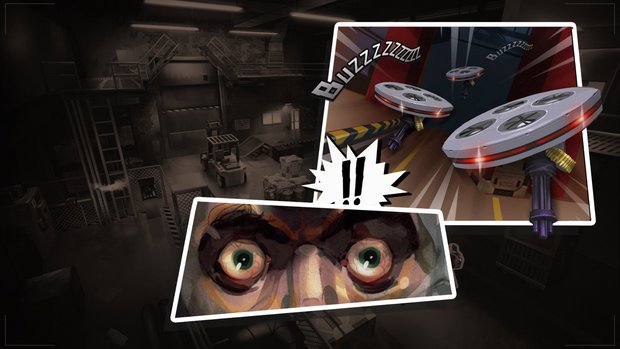
Worse than the harsh difficulty of the battles are the rewards; I was frequently disappointed that battles that exceeded 15 minutes barely resulted in a noticeable gain in Experience Points (XP). Those XP can be crucial as they lead to level increases, which not only build your individual characters’ total health points, but also provide skill points that allow your characters to advance on RPG-style tech trees. Frank can select individual skills in the Investigation, Leadership, or Long Guns tree; Sally, brute that she is, has Brawler, Toughness, or Handguns skills available. In fact, the performance of adventure-y tasks like using an ID card to unlock a computer terminal seems to be more rewarding from an XP perspective—not the right balance for a game where it feels like well over half of your play time is spent in punishing combat.
Sunday Gold even ignores the modern convention of restoring all stats at the end of each battle; your exhausted party will have to rebuild using whatever items and AP you have left and prepare for the next encounter. I’ve seen other players agree that the combat is intensely difficult “in the early stages,” but I personally (being the adventure game sissy that I tend to be) never felt like the challenge really let up. You’re likely to come across plenty of healing items for your health points, but what really hurts are battles that leave you low on AP, requiring you to cycle to the next turn, which increases enemy alert and possibly puts you in position for another immediate battle—the circle of death can be brutal.
I’ve now dissected all the ways that Sunday Gold doesn’t feel like an adventure, so it’s only fair to talk about the ways it does succeed as a story-driven game on its own merits. The three missions (taking place at an office high-rise, a laboratory, and the colorful mansion of the antagonist) proceed with enough energy and intrigue to keep you motivated. The actual weird dog racing story itself is not the centerpiece (and it is a linear story, without branches or choice-driven aspects that are common to RPGs and modern adventures), and outside of the three “heroes” there is little worth referencing as far as compelling characters. However, the suspense of sneaking (or attempting to) through the environments trying to gather either the insight or the keys necessary to access the next portion is effective as information is slowly gathered within each mission. The dialogue is so over-the-top profane and intense that at the very least it’s entertaining, and though the characters don’t sound like anyone you’d like to hang out with, the voice-overs are authentically accented and the primary actors bring a high level of commitment to their character.
Each chapter provides 4-5 hours of gameplay, so expect a fairly substantial 13-15 hour game if you can successfully navigate the combat. If you’re misfortunate enough to fail more than a few battles, particularly if you lose them in excruciatingly slow fashion, you can expect that hour number to be higher. This is a game of a very specific and deliberate style, and a gameplay model that is geared toward those who appreciate the statistical combat focus of RPGs with maybe some adventure-type exploration built in. You can safely steer clear if a traditional adventure is what you’re hoping for.
Final Verdict
As a reviewer, I suppose it’s my duty to make a definitive statement about the quality of the game, but Sunday Gold presents a very clear opportunity for me to recognize when a game of high quality just simply does not connect for me. I see praise for this game from roleplaying circles that commend its exacting combat and resource management, which are precisely the aspects that didn’t appeal to me at all. I am certain that there is a significant audience for this type of RPG-heavy story game with its cruel and bleak style and hostile antihero protagonists. The combat mechanics are complex and generally interesting, the difficulty curve is elevated at a level sure to please adherents to this type of game, and the story and dialogue at least take some wild swings. A game like Sunday Gold that is this committed to its own eccentricities at least plays its cards immediately—you’ll know before the brutal prologue ends whether this is a world you’re compelled to spend time in, or whether it’s just a right load of bollocks.
Hot take
It would be nice to focus solely on how the bleak setting is intriguing, the stealth missions often feel cool, and the characters are at least entertaining, if not quite appealing—but it’s tough to do that when Sunday Gold is simply overrun with punishing turn-based combat and related RPG-style skill mechanics, and the adventure side of this genre hybrid is consistently minimized.
Pros
- Dripping with bleak style
- Story is interesting enough and builds well through the missions
- Voice acting is near-perfect in its commitment to brutal Cockney anger
- Composure mechanic is neatly implemented
- Complex and challenging combat is ever-present, if you’re into that sort of thing
Cons
- Not a great-looking game, particularly the static backgrounds
- Lacks any characters with a measure of likeability
- Turn-based cycle of AP usage is really punishing
- Complex and challenging combat is ever-present, if you’re not into that sort of thing
Evan played Sunday Gold on PC using a review code provided by the game's publisher.


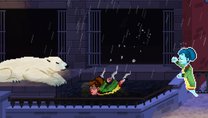


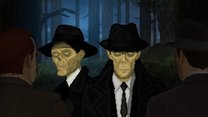

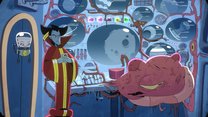


1 Comment
Want to join the discussion? Leave a comment as guest, sign in or register in our forums.
"Was that really necessary, I found myself asking, to so overstylize the character movement rather than just show them walking? If you have a fear of electric shock, you’ll find the constant lightning teleports to be a fairly unpleasant aspect of the game (and don’t shame—electrophobia is a real thing). " While the reviewer's criticism of the stylized character movement might be valid, the way the criticism is framed - "If you have a fear of electric shock..." - has to be one of the sillier stretches I've ever read in a review. Regardless, the review does a good job of pointing out that this game is definitely not for me, and seems to be an adventure game only insofar as it contains a few elements that are common, albeit not exclusive, to some adventure games (story, exploration, and perhaps 'adventure' in the literal but not classic-gaming sense of the word).
Reply
Leave a comment